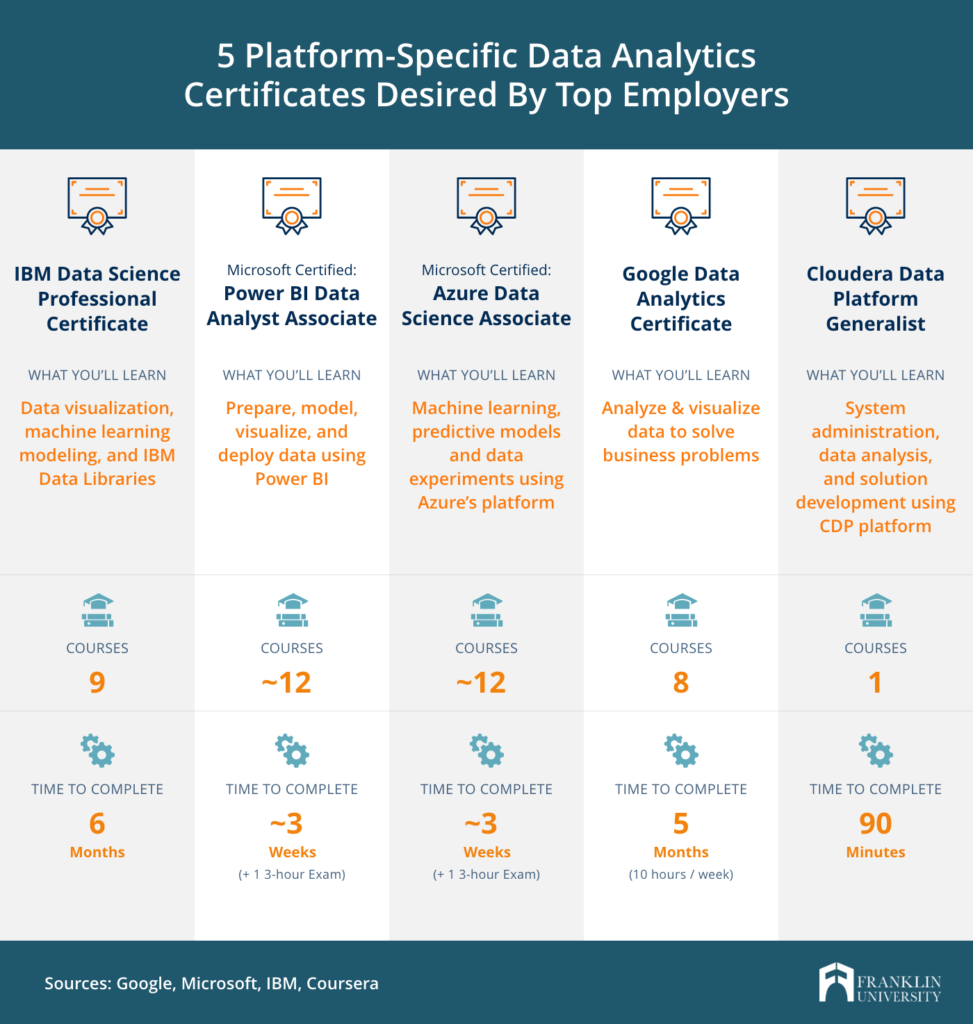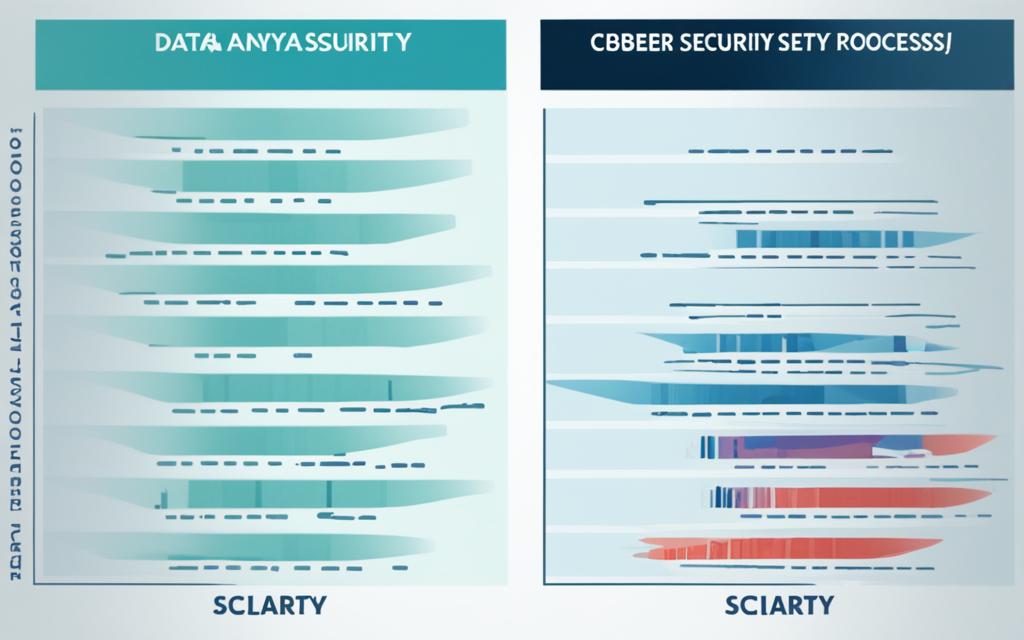Choosing a career path can be a daunting task, especially when faced with multiple options that are equally compelling. One such comparison that often arises is the choice between becoming a data analyst or pursuing a career in cyber security. Both fields offer exciting opportunities for growth and development, but understanding the key differences and similarities between them is crucial in making an informed decision.
When it comes to data analysis, professionals in this field play a vital role in helping organizations make sense of the vast amounts of data they collect. They are responsible for analyzing and interpreting data to uncover valuable insights, trends, and patterns that can drive strategic decision-making. With their impeccable analytical skills and expertise in data manipulation, data analysts are instrumental in driving business success.
Cyber security, on the other hand, focuses on protecting sensitive information, networks, and systems from cyber threats and attacks. Cybersecurity professionals play a crucial role in identifying potential vulnerabilities and implementing robust security measures to mitigate risks. With the increasing number of cyber attacks, the demand for skilled cyber security professionals has skyrocketed in recent years.
Both data analysts and cyber security professionals require a strong foundation in technology and possess excellent problem-solving and critical thinking abilities. However, their specific skill sets differ. Data analysts need to be proficient in data visualization, statistical analysis, and programming languages, while cyber security professionals must have a deep understanding of networking, cryptography, and risk management.
Ultimately, the choice between a career as a data analyst or a cyber security professional depends on your interests and strengths. While data analysis offers opportunities to uncover actionable insights and contribute to business growth, cyber security provides the satisfaction of protecting valuable data and ensuring the integrity of systems.
Throughout this article, we will delve deeper into the details of each profession, explore the educational and training requirements, compare job outlooks and salaries, and discuss the career pathways and growth opportunities in data analysis and cyber security. By the end, you’ll have a comprehensive understanding of both fields, enabling you to make an informed career decision.
Data Analyst vs Cyber Security: Key Takeaways:
- Choosing between a career as a data analyst or in cyber security requires understanding the key differences and similarities between the two fields.
- Data analysts are responsible for analyzing and interpreting large sets of data to provide valuable insights for organizations.
- Cyber security professionals focus on protecting sensitive data, networks, and systems from cyber threats and attacks.
- Data analysts require proficiency in data visualization, statistical analysis, and programming languages, while cyber security professionals need a deep understanding of networking, cryptography, and risk management.
- The choice between data analysis and cyber security ultimately depends on individual interests and strengths.
What is a Data Analyst?
A data analyst plays a crucial role in today’s data-driven business landscape. As organizations collect and store vast amounts of data, data analysts are responsible for extracting meaningful insights and valuable information from this raw data. They utilize their analytical skills and expertise to analyze, clean, and interpret complex datasets.
Data analysts have diverse job responsibilities that revolve around data manipulation and analysis. Their primary task involves developing and implementing data collection systems and strategies, as well as conducting thorough data analysis using statistical methods and tools. Whether it’s identifying trends, patterns, or correlations, data analysts apply techniques to uncover insights that drive informed decision-making within organizations.
“As data becomes the new oil in today’s digital age, data analysts are the ones who refine and distill it into actionable insights.”
Data analysts are also responsible for designing and creating data visualizations in the form of charts, graphs, and reports to effectively communicate their findings to stakeholders at all levels. They collaborate with cross-functional teams, including business executives, marketers, and data scientists, to continuously improve business strategies and optimize performance based on data-driven insights.
To excel as a data analyst, a combination of technical and soft skills is required. Strong proficiency in SQL, Python, R, or other programming languages is essential for data manipulation and analysis. Additionally, data analysts must possess solid knowledge of statistical concepts and experience working with data visualization tools such as Tableau or Power BI. Attention to detail, critical thinking, and problem-solving skills are also crucial for effectively analyzing and interpreting data.
In summary, data analysts play a vital role in organizations by harnessing the power of data to drive informed decision-making. Their job responsibilities encompass data analysis, visualization, and communication with stakeholders. They need to possess a blend of technical skills, statistical knowledge, and critical thinking abilities to excel in their field.
Key Responsibilities of a Data Analyst
- Developing and implementing data collection systems and strategies
- Conducting thorough data analysis using statistical methods and tools
- Identifying trends, patterns, and correlations in data
- Designing and creating data visualizations to communicate findings
- Collaborating with cross-functional teams to improve business strategies
Skills Required for Data Analysts
- Strong proficiency in SQL, Python, R, or other programming languages
- Knowledge of statistical concepts and techniques
- Experience with data visualization tools (e.g., Tableau, Power BI)
- Attention to detail and ability to accurately analyze large datasets
- Strong critical thinking and problem-solving skills
What is Cyber Security?
Cyber security is an essential discipline in today’s digital world that focuses on safeguarding sensitive data, networks, and systems from cyber threats and attacks. With the increasing reliance on technology, organizations and individuals alike face significant risks from hackers, viruses, malware, and other malicious activities. To combat these threats, cyber security professionals work diligently to develop and implement strategies, policies, and technologies that protect valuable information and ensure the integrity and privacy of digital assets.
Effective cyber security requires a comprehensive understanding of the evolving landscape of cyber threats and vulnerabilities. Cyber security professionals play a vital role in identifying potential risks, detecting breaches, mitigating damage, and implementing preventive measures to safeguard against future attacks. They work closely with cross-functional teams, including IT departments, law enforcement agencies, and senior management, to develop robust security frameworks that address ever-increasing and sophisticated cyber threats.
Job Responsibilities
The job responsibilities of cyber security professionals vary depending on their specific roles within an organization. However, some common responsibilities include:
- Developing and implementing security protocols and policies to protect digital assets.
- Conducting risk assessments to identify vulnerabilities and potential threats.
- Monitoring systems and networks for security breaches or suspicious activities.
- Investigating and responding to security incidents, such as data breaches or cyber attacks.
- Collaborating with IT teams to implement security measures, including firewalls, encryption, and access controls.
- Providing guidance and training to employees to ensure compliance with security protocols.
- Staying up-to-date with the latest cyber security trends, tools, and technologies.
Skills Required
To be successful in the field of cyber security, professionals must possess a combination of technical expertise, analytical skills, and a deep understanding of cyber threats and mitigation strategies. Some key skills required in this field include:
- Cyber Security Knowledge: A strong knowledge of cyber security concepts, including network security, encryption, authentication, and incident response.
- Technical Proficiency: Proficiency in various security tools, technologies, and programming languages, such as firewall management, intrusion detection systems, and python scripting.
- Problem-Solving: The ability to analyze complex security issues, identify vulnerabilities, and develop effective solutions to mitigate risks.
- Communication: Strong verbal and written communication skills to effectively communicate security risks, incidents, and recommendations to technical and non-technical stakeholders.
- Continuous Learning: The willingness to stay updated with the latest cyber security trends, emerging threats, and best practices through continuous learning and professional development.
With the increasing scope and sophistication of cyber threats, the demand for skilled cyber security professionals continues to grow. Organizations across industries recognize the critical importance of protecting their digital assets and customer data, leading to a variety of career opportunities for individuals interested in this field. By acquiring the necessary skills and staying abreast of the evolving cyber security landscape, professionals can make significant contributions to ensuring robust cyber defense strategies that effectively mitigate risks and safeguard sensitive information.
Education and Training for Data Analysts
For individuals aspiring to become data analysts, a solid educational foundation is essential. While there are multiple pathways to enter this field, a strong background in mathematics, statistics, computer science, or a related discipline is highly valued. Many employers require at least a bachelor’s degree in a relevant field, although some may accept candidates with equivalent work experience or industry certifications.
To stand out in a competitive job market, aspiring data analysts can pursue specialized education and training programs that refine their skills in data analysis and data management. These programs provide valuable hands-on experience with industry-standard tools and software used in data analytics, such as SQL, Python, R, and Tableau. Additionally, they offer opportunities to work on real-world projects, allowing students to showcase their practical abilities to potential employers.
Required Qualifications for Data Analysts:
- A bachelor’s degree in mathematics, statistics, computer science, or a related field
- Strong analytical and problem-solving skills
- Proficiency in programming languages such as SQL, Python, or R
- Knowledge of statistical methods and data visualization techniques
- Experience with data cleaning, manipulation, and analysis
- Excellent communication and presentation skills
Certifications for Data Analysts:
- [certification name 1] – This certification validates proficiency in analyzing and interpreting data, and is highly regarded by industry professionals.
- [certification name 2] – This certification focuses on specific data analysis tools and techniques, providing a comprehensive understanding of data analytics.
- [certification name 3] – This certification demonstrates expertise in using advanced statistical methods to derive valuable insights from data.
Data analysts who possess relevant certifications not only enhance their skill set but also increase their marketability and credibility in the field. These certifications serve as a testament to their knowledge and proficiency in data analysis, making them more attractive to potential employers.
Example Data Analyst Certification Comparison

Obtaining relevant certifications is a prominent way for data analysts to showcase their expertise and keep up with industry trends and advancements. It provides tangible proof of their dedication to continuous learning and professional growth.
By combining a strong educational background with additional certifications and training, aspiring data analysts can maximize their opportunities for career advancement and success in this rapidly growing field.
Education and Training for Cyber Security Professionals
When it comes to pursuing a career in cyber security, obtaining the necessary education and qualifications is essential. Cyber security professionals play a crucial role in safeguarding sensitive data, networks, and systems from potential threats.
To embark on a successful journey in cyber security, individuals have various educational paths to consider. One common route is earning a bachelor’s degree in Computer Science, Information Technology, or a related field. These degree programs provide a solid foundation in essential topics such as network security, cryptography, and ethical hacking.
In addition to a bachelor’s degree, certifications are highly valued in the cyber security industry. Certifications validate a professional’s expertise and competence in specific areas of cyber security. Popular certifications include Certified Information Systems Security Professional (CISSP), Certified Ethical Hacker (CEH), and CompTIA Security+.
Specialized training programs also offer valuable opportunities for individuals looking to enhance their skills and knowledge in specific areas of cyber security. These programs cover topics such as incident response, penetration testing, and digital forensics. They provide hands-on experience and practical skills that can be applied directly in the field.
Key Qualifications for Cyber Security Professionals:
- Strong understanding of network security, cryptography, and vulnerability management.
- Proficiency in programming languages, such as Python or C++, to develop and implement secure systems.
- Knowledge of security best practices, compliance regulations, and risk assessment methodologies.
- Problem-solving skills to identify and address security vulnerabilities effectively.
- Effective communication and collaboration skills for working with cross-functional teams.
Beyond formal education and qualifications, practical experience and continuous learning are vital in the ever-evolving field of cyber security. Staying updated on the latest technology trends, security threats, and industry regulations is essential for professionals to excel in their careers.

Job Outlook and Salary Comparison
When considering a career path, it’s essential to examine both the job outlook and salary potential. In this section, we will compare the job outlook and salary prospects for data analysts and cyber security professionals, providing valuable insights into these two fields.
The Job Outlook
Both data analysis and cyber security are rapidly growing fields with promising job prospects. As the world becomes more data-driven and digitalized, the demand for skilled professionals in these areas continues to rise.
Data analysts play a crucial role in helping organizations extract valuable insights from vast amounts of data. With the increasing reliance on data-driven decision-making, the job outlook for data analysts remains highly favorable. According to the Bureau of Labor Statistics, the employment of data analysts is projected to grow 32% from 2020 to 2024.
On the other hand, cyber security professionals are in high demand due to the escalating threat landscape in the digital realm. As cyber attacks become more sophisticated, organizations across various industries seek skilled cyber security experts to protect their sensitive data and systems. The Bureau of Labor Statistics anticipates a 32% growth in cyber security jobs from 2020 to 2022.
Salary Comparison
Salary is an important factor to consider when evaluating career choices. The earning potential in both data analysis and cyber security is substantial, but there are variations based on factors such as experience, location, and industry.
Data analysts typically enjoy competitive salaries due to the specialized skills they possess. According to PayScale, the median annual salary for data analysts in the United States is approximately $$120,360 per year, with opportunities for higher earnings as they gain expertise and seniority.
Cyber security professionals also command impressive salaries, reflecting the critical nature of their work. The median annual salary for cyber security analysts in the United States is around $$120,360, according to BLS. However, salaries can significantly increase for individuals with advanced certifications, extensive experience, and managerial positions.
It’s important to note that these salary figures can vary based on factors such as geographic location, industry sector, company size, and individual qualifications. Professionals in both fields can explore additional opportunities for career growth and higher earning potential by pursuing advanced certifications, acquiring specialized skills, and staying updated on the latest industry trends.
Understanding the job outlook and salary comparison between data analysis and cyber security can help individuals make informed decisions when choosing a career path. While both fields offer promising prospects, it’s crucial to consider personal interests, skills, and long-term goals when determining the most suitable option.

Career Pathways and Growth Opportunities
Professionals pursuing careers in data analysis and cyber security have access to diverse and promising career pathways and growth opportunities. With the increasing reliance on data-driven decision making and the ever-growing threat of cyber attacks, the demand for skilled individuals in both fields continues to rise.
Career Pathways in Data Analysis:
Data analysts can find opportunities in various industries such as finance, healthcare, technology, and marketing. They can work as:
- Data Scientists: Analyzing complex datasets to identify patterns and trends.
- Business Analysts: Evaluating business processes and providing data-driven insights to improve efficiency and profitability.
- Market Research Analysts: Conducting market research and analyzing consumer data to support marketing strategies.
Career Pathways in Cyber Security:
Cyber security professionals can explore roles in both public and private sectors, including:
- Information Security Analysts: Implementing security measures to protect organizations from cyber threats.
- Network Security Engineers: Safeguarding networks and systems to prevent unauthorized access and data breaches.
- Security Consultants: Assisting organizations in assessing and improving their overall security posture.
In addition to these specific career paths, individuals in both data analysis and cyber security have the opportunity for continuous learning and advancement. By honing their skills and staying updated with emerging technologies and industry trends, professionals can unlock even more growth opportunities.
Growth Opportunities:
As technology continues to evolve and data becomes increasingly valuable, the growth potential in both data analysis and cyber security remains promising. Professionals in these fields can expect:
- Leadership Positions: With experience and expertise, individuals can progress to managerial and directorial roles, overseeing teams and projects.
- Specializations: By focusing on specific areas such as machine learning, data privacy, or ethical hacking, professionals can develop specialized expertise that is highly sought after.
- Entrepreneurship: As data-driven decision making becomes integral to businesses, professionals in data analysis or cyber security have the opportunity to start their own consulting firms or technology companies.
By seizing these growth opportunities, individuals can pursue fulfilling and lucrative careers in either data analysis or cyber security.
Conclusion
After considering the comparisons between data analysis and cyber security, it becomes evident that both fields offer unique opportunities for individuals seeking a rewarding career in the technology sector. When deciding between these two paths, certain factors should be taken into account.
For those inclined towards data analysis, the role provides an exciting avenue for exploring and interpreting large volumes of data to extract valuable insights that drive business decision-making. A strong foundation in analytics, statistical modeling, and programming languages such as Python and R is essential for success in this field.
On the other hand, a career in cyber security offers the opportunity to protect organizations and individuals from the increasing threat of cyber attacks and data breaches. Professionals in this domain need to possess a deep understanding of network security, cryptography, and risk assessment, along with relevant certifications like Certified Information Systems Security Professional (CISSP) or Certified Ethical Hacker (CEH).
In conclusion, while both data analysis and cyber security present promising career prospects, aspiring professionals should consider their personal interests, strengths, and long-term goals. It is important to weigh factors such as job responsibilities, required skills, education and training options, job outlook, salary potential, and growth opportunities in order to make an informed decision. By carefully evaluating these aspects, individuals can choose a career path that aligns with their passion and sets them up for success in the ever-evolving digital landscape.
FAQ
What are the main differences between a career as a data analyst and a career in cyber security?
A data analyst primarily focuses on analyzing and interpreting large sets of data to provide valuable insights for organizations, while a cyber security professional is responsible for protecting sensitive data, networks, and systems from cyber threats and attacks.
What are the job responsibilities of a data analyst?
The job responsibilities of a data analyst include collecting and analyzing data, creating data visualizations and reports, identifying trends and patterns, and providing recommendations based on data insights.
What are the job responsibilities of a cyber security professional?
A cyber security professional is responsible for identifying and mitigating cyber threats, implementing security measures to protect networks and systems, monitoring for vulnerabilities, conducting risk assessments, and developing incident response plans.
What skills are required to excel as a data analyst?
To excel as a data analyst, one needs strong analytical and problem-solving skills, proficiency in data analysis tools such as Python or SQL, knowledge of statistical analysis, and the ability to communicate findings effectively.
What skills are required to succeed in the field of cyber security?
The field of cyber security requires skills such as strong knowledge of networking and computer systems, familiarity with security protocols and technologies, the ability to identify and respond to security incidents, and strong problem-solving and communication skills.
What educational qualifications are needed to become a data analyst?
While there is no specific degree required, most data analysts hold a bachelor’s degree in fields such as mathematics, statistics, computer science, or business analytics. Additionally, certifications in data analysis tools and techniques can enhance job prospects.
What educational qualifications are needed to pursue a career in cyber security?
A career in cyber security typically requires a bachelor’s degree in computer science, information technology, or a related field. Specialized certifications such as Certified Ethical Hacker (CEH) or Certified Information Systems Security Professional (CISSP) are also highly valued.
What is the job outlook for data analysts and cyber security professionals?
Both data analysts and cyber security professionals have strong job prospects. The demand for skilled data analysts is expected to grow due to the increasing reliance on data-driven decision making, while the need for cyber security professionals is driven by the growing threat of cyber attacks and the importance of data protection.
How does the salary of a data analyst compare to that of a cyber security professional?
While salaries can vary based on factors such as experience and location, both data analysts and cyber security professionals can earn competitive salaries. Generally, cyber security professionals tend to have higher earning potentials due to the high demand for their specialized skills and expertise.
What are the career growth opportunities in data analysis and cyber security?
Both fields offer promising career growth opportunities. Data analysts can progress to roles such as senior data analyst, data scientist, or data analytics manager. Cyber security professionals can advance to positions such as information security analyst, security architect, or chief information security officer (CISO).
What factors should individuals consider when deciding between a career as a data analyst or a career in cyber security?
Individuals should consider their interests, skills, and aptitudes in data analysis or cyber security, as well as the job market demand, potential salary, and long-term career prospects in each field. It is also valuable to seek advice from professionals already working in these fields or to gain hands-on experience through internships or entry-level positions.





